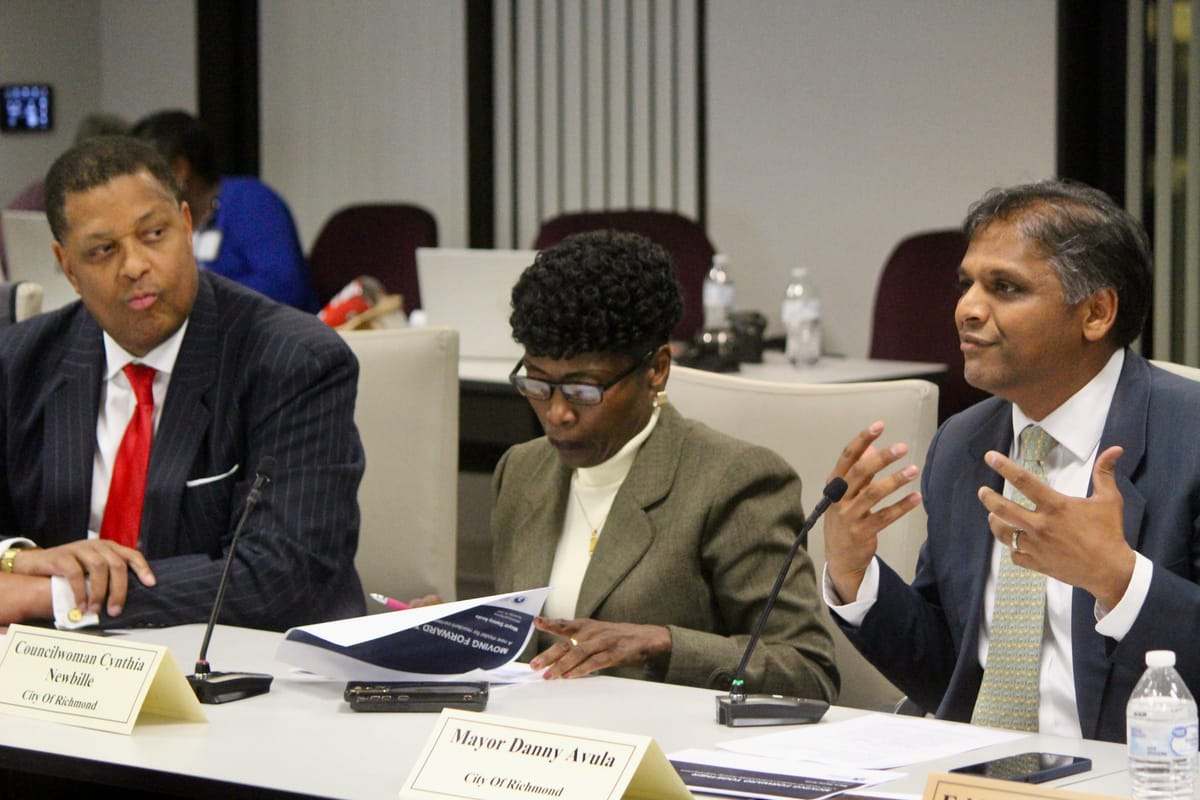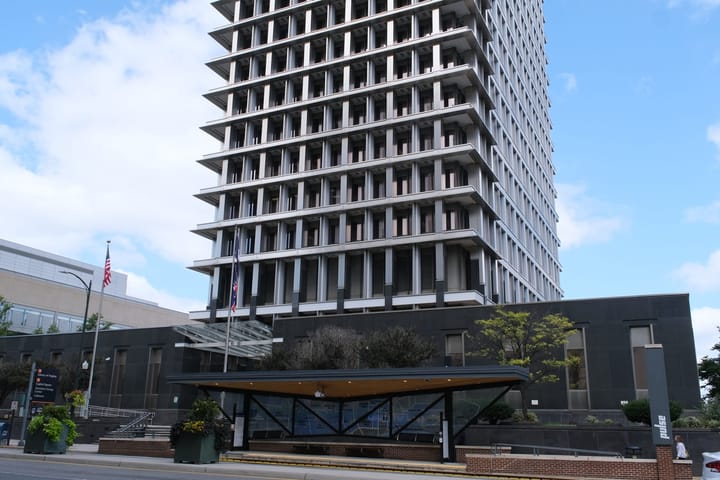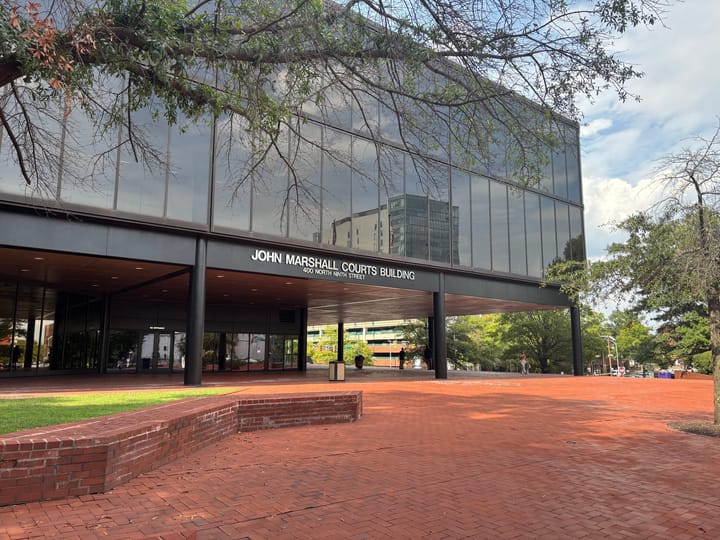Avula calls for ‘shared governance’ of Gilpin Court redevelopment

Mayor Danny Avula proposed Wednesday that the city of Richmond and its independent public housing authority adopt “shared governance” of the redevelopment of Gilpin Court.
“Our destinies are linked on this,” he told the Richmond Redevelopment and Housing Authority’s Board of Commissioners at its November meeting, urging the board to give the city “a true, authentic seat at the table with you.”
Avula’s proposed Joint Gilpin Transformation Working Group would include RRHA CEO Stephen Nesmith, RRHA Board of Commissioners Chair Eddie Jackson, Avula, Richmond Chief Administrative Officer Odie Donald Jr., additional “relevant” city staff and City Council members, community partners like Richmond Public Schools, the developers engaged to lead the Gilpin project, and representatives of Gilpin residents — “including but not limited to tenant council leaders.”
The mayor asked that the commissioners, who govern RRHA, give him an answer by Dec. 17, with the expectation that if they agree, the body would begin working with the city to craft a memorandum of agreement.
No decision was made Wednesday, but Jackson reacted to Avula’s presentation warmly and pledged to meet the December deadline, saying he would call a special meeting on the matter.
“Mayor, I apologize if I seemed a bit giddy as you were sharing with us your expectations,” he said. “I see no cause for interruption in regards to what we've already started. I expect that our staff, our collective board, will put our minds together to meet this challenge. I don't see any reason why we can't.”
Nesmith too later told the board that RRHA “will be taking all of his items that he made in his presentation” and will respond by Dec. 17.
Disagreement and demands
Avula and RRHA have previously disagreed on how the authority should proceed with the redevelopment of Gilpin Court, Richmond’s oldest and largest public housing community. In September, Avula sent Nesmith a letter outlining eight steps RRHA would have to take to win his support for the plan. Nesmith subsequently said he was disappointed by Avula’s response and characterized the move as a roadblock to further negotiations on the issue.
The mayor reiterated many of those concerns to the board Wednesday, including the need to develop a tenant bill of rights and to provide residents materials that clearly lay out the timeline and stages of the redevelopment and the options that will be available to them.
Informing residents about their choices is particularly important, Avula emphasized, because the redevelopment will involve a shift from tenants living in public housing to tenants living in units owned by RRHA’s development partner through the use of housing vouchers.
That approach is not unusual for public housing authorities seeking to replace aging and crumbling housing structures; over the past few decades, the federal government has pushed authorities to carry out redevelopment through public-private partnerships and to rebuild communities as mixed-income neighborhoods rather than concentrations of public housing units.
But the shift to vouchers will come with a different set of protections for tenants, making it critical that residents have access to services that will help them navigate the transition and not lose their right to housing, said Avula.
“One of the things that we saw in Creighton was that residents maybe didn't know what their current status was, or what was required if they were going to become a voucher user, and what implications that might have for them once they made the move,” he said.
Among the commitments he again urged RRHA to make was that it agree to use the Jackson Ward Community Plan crafted several years ago as the blueprint for the redevelopment. The authority’s current proposal includes “significant departures” from the earlier document, said Avula, pointing particularly to the absence of any plans to develop affordable units that will be sold rather than rented and what he called a shortfall of 160 units needed to ensure that every current resident is guaranteed a place in the future.
Little progress on the points of disagreement has been evident to the public since mid-September, when the RRHA board publicly backed the continuation of talks between Nesmith and the city but turned down Nesmith’s request to begin getting federal approvals for the project.
But discussions have been proceeding behind the scenes in multiple meetings involving Nesmith, Avula and, in some cases, Jackson.
On Wednesday, Avula indicated he and RRHA have made headway on some of his goals.
In his conversations with Nesmith, “I really felt a sense of commitment, of partnership and affirmation,” he said. “Mr. Nesmith was clear that … we can get to all eight of the things that are on your list.”
Richmond Development Corporation
Two potentially touchy issues were evident Wednesday evening.
The eighth of Avula’s asks was that RRHA commit to providing the city detailed information about its finances, property conditions, resources and programming.
“We sense the hesitance to kind of put it all out there,” Avula told the board. “I just want to reiterate, we are completely linked on the future of this.”
The Richmond Development Corporation, a nonprofit subsidiary of RRHA that Nesmith has said he wants to play a more active role in the authority’s operations, also remains a point of debate.
Earlier this year, a failed attempt by Nesmith to transfer the Gilpin Court development to the development corporation set off a firestorm of protest from residents and tenant advocates. While the RRHA chief has defended the subsidiary as a common tool used by other public housing authorities nationwide to get more flexibility in their financial dealings, confusion about how the RDC fits into the Gilpin redevelopment has lingered.
Avula has been critical of the governance of the organization, which is stacked with RRHA officials. One of his eight demands this September was that the authority withdraw any proposals to transfer parts of Gilpin to the RDC until those concerns were resolved.
On Wednesday, the board of commissioners approved a new plan for how the RDC board will be composed. A copy of the resolution provided to The Richmonder Thursday states that the new seven-person RDC board will include:
- The RRHA CEO
- RRHA's chief financial officer
- RRHA's senior vice president of real estate and community development
- An RRHA commissioner, appointed by the board chair
- An RRHA resident commissioner, appointed by the board chair
- RRHA's voucher participant commissioner
- The president of the Richmond Tenant Organization
Three RRHA officials — the authority's chief of staff, chief operating officer and senior vice president of affordable housing — have been removed from the RDC board.
On Wednesday, Avula praised the addition of more residents to the body but asked for the RRHA commissioners to add a representative of the city, saying that absence "sticks out to me."
"I think it's really important that there be some city representation on that," he said. "And so I would ask that you all consider that before making that decision."
The RRHA board voted to approve the new structure on a 5-2 vote but did not take up Avula's request. Nesmith told members they would be free to revisit the question of whether to add a city representative in the future.
This story has been updated with additional information about the RDC board resolution provided to The Richmonder Thursday. Contact Reporter Sarah Vogelsong at svogelsong@richmonder.org






